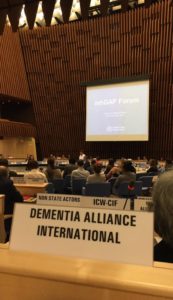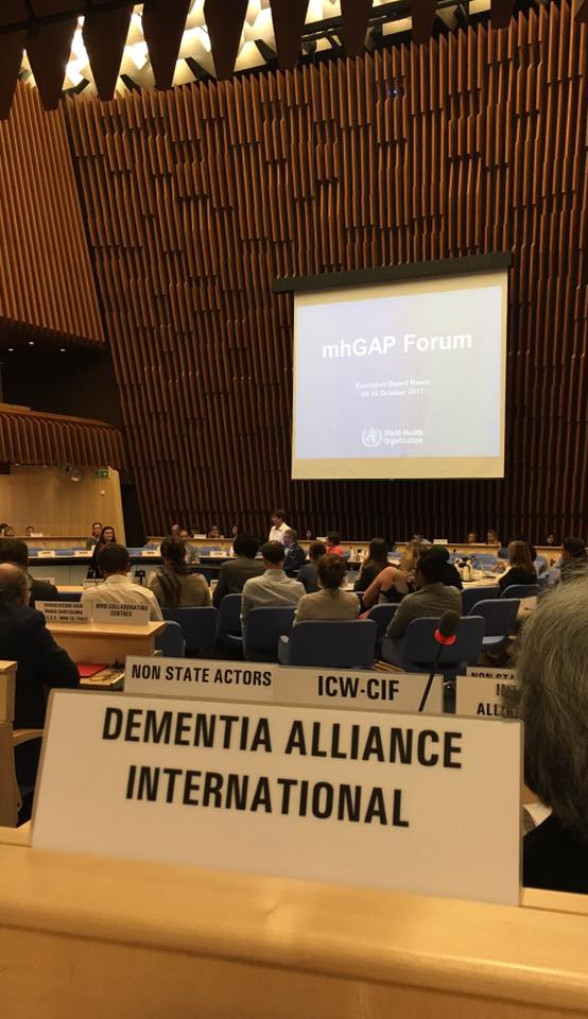 Last week as Chair and CEO of DAI, Kate Swaffer was invited to attend the mhGAP Forum (mh = mental health) in Geneva. This involved some pre meetings and planning, and then two full days at the WHO attending plenary sessions, and attending topical side sessions.
Last week as Chair and CEO of DAI, Kate Swaffer was invited to attend the mhGAP Forum (mh = mental health) in Geneva. This involved some pre meetings and planning, and then two full days at the WHO attending plenary sessions, and attending topical side sessions.
Although we felt there was a priority to attend the Quality Rights side session, as DAI has been involved in that work, Kate was invited to present at the side session discussing the Global Action Plan on Dementia: A Public Health Response. The following is her speech:
Implementing the Global Dementia Action Plan into policy
"Thank you for this invitation to speak today, representing members of Dementia Alliance International, all people formally diagnosed with dementia now representing members from 44 countries. Thank you also to Drs Saxena and Dua and their team at the WHO for their work on the mhGAP App launched earlier today, and for the Global action Plan on A Public Health Response to Dementia, adopted earlier this year at the World Health Assembly.
I’d like to commence by saying the symptoms of dementia must be seen and supported the same way as people with any acquired cognitive disAbilities, and that by doing this, we will all then come to understand “there is a systemic and gross underestimation of the capacity of all people diagnosed with deMEntia, even in the later stages of the disease.”
Late stage management of dementia is still prevalent, and continuing this will have a significant cost, not only to the well being and Quality of Life of people with dementia and our families, but also on our economy.
- In spite of often receiving earlier diagnoses, we are still being Prescribed Disengagement®, i.e. being told to go home and die via aged care, as if there is ‘nothing that can be done’
- We are not provided with rehabilitation or other re-abling post diagnostic support
- We are not being provided with the same disAbility assessment and support as every other person with an acquired disAbility receives
- These points are all relevant to national dementia plans
By harnessing the UN CRPD and other Conventions in policy and national dementia strategies, we will:
- Significantly improve the quality of life of persons with dementia and our families and care partners
- Increase independence
- Reduce the economic cost of dementia to individuals, families and governments
- Ensure dementia inclusive and accessible communities
The CRPD is relevant to persons with dementia and there can be little doubt that persons with dementia are addressed by the definition of disAbility in the Convention, and are therefore intended beneficiaries.
The WHO Global Disability Action Plan 2014-2021 is fully based on CRPD Principles and Articles, and it also has good indicators for assessing progress. Hence this also means CRPD must be reflected in regional and national dementia plans and strategies.
The WHO Global Action Plan: A Public Health Response to Dementia set the stage in May 2017. Governments, in partnership with civil society, people with dementia, their families must start now by preparing national dementia plans in their own countries, which incudes a human rights approach to dementia. As I understand it, the only truly accountable parts of the Global Action Plan are the 7 cross cutting principles.
Community Based Rehabilitation (CBR) needs to be considered when implementing this Action Plan into policy. CBR is an important part of human rights, and of dementia friendly communities. The aim of community-based rehabilitation is to help people with disAbilities, by:
- Establishing community-basedprograms for social integration, equalization of opportunities, and physical therapy rehabilitationprograms for people with any type of disAbility
- This is important in the context of the GDAP and in the development of national policies.
For our communities to be supporting people with dementia, based on human rights, a new pathway of support is needed. It is also part of being a dementia friendly society, as without adequate health care and disability support, it won’t matter how many dementia friends programmes a country has, there will be very little tangible difference to our lives.
We need a new pathway of psycho social and disAbility support to live with, not only die from dementia, which is not based on deficits, and does more than assess ADL’s and medication.
- Timely Diagnosis
- Focus on well being/QoL
- Acquired Brain Injury rehabilitation post Dx, that includes Speech pathology, Neuroplasticity, Occupational Therapy, Neurophysiotherapist.
- disAbility assessment and support , immediately post diagnosis
- Grief and Loss counselling, not just information about BPSD.
- Peer to peer support groups for oeople with dementia, our care partners and families, and especially our children
- Support to maintain pre dx lifestyle
- Support to continue working if YOD (and is a personal choice)
- Support to continue usual activities, socialising, sport, recreation, community engagement, etc
- Inclusive and accessible communities (not just dementia friendly)
It is also imperative we focus on risk reduction strategies – e.g. life style changes (as we do for other chronic diseases).
DAI’s Next Steps:
- Working with countries and civil society to ensure human rights and implementation of CRPD, SGD’s and CBR
- Supporting Alzheimer’s societies in developing HR policies & plans
- Continuing to submit parallel reports to the UN and the WHO
- Promote human rights approach to dementia at all conferences and events
- Raising our concerns about human rights of persons with dementia in WHO Disability Policy, CBR and regional and national dementia strategies
- Working with disability organisations, e.g. IDA and IDDC
DAI is open to suggestions, advice, and above all support from all organisations and groupings of or for people with dementia. Some of our recommendations include:
- Engaging with the United Nations Committee on the Convention on the Rights of Persons with Disabilities (CRPD), including through policy making processes
- Seeking to develop productive relationships with the global network of National Human Rights and Disability Rights Institutions, e.g. the International Disability Alliance
- Preparing and disseminating widely information, and developing policy on the UNCRPD and the rights of persons with dementia
- Encouraging and supporting national and regional groups and organisations to participate in the examinations by the United Nations Committee on the Rights of Persons with Disabilities and other Conventions.
Finally, I have some questions for countries and civil society to consider:
- To what extent are your dementia policies based on human rights?
- How closely do you work with other disAbility organisations in your country or region?
- Do you know how they have used CRPD?
- Will you join them to ensure that people with dementia are included?
- How are we going to measure 75% of countries have implemented the GDAP by 2025?
Thank you."
Kate Swaffer
Chair, CEO & Co-founder
Dementia Aliance International
